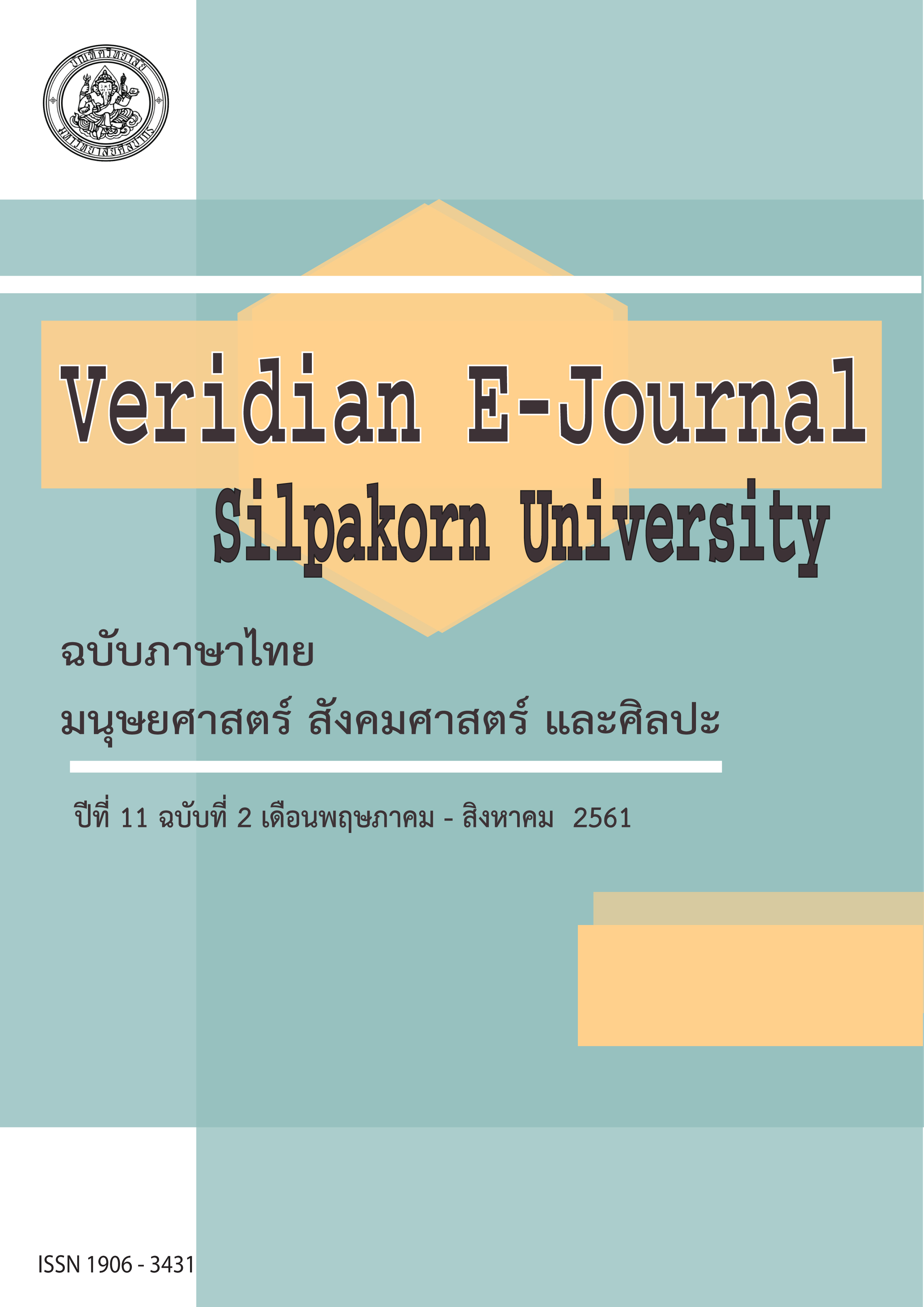จริยธรรมนักข่าวพลเมืองในการนำเสนอข่าวเด็กผ่านสื่อสังคมออนไลน์ (The Ethics of citizen journalist on children News reporting via social media.)
Main Article Content
Abstract
การวิจัยในครั้งนี้มีวัตถุประสงค์เพื่อ 1) ศึกษาปัญหาของการนำเสนอข่าวเด็กของนักข่าวพลเมืองในสื่อสังคมออนไลน์ 2) สร้างแนวทางจริยธรรมในการนำเสนอข่าวเด็กของนักข่าวพลเมืองในสื่อสังคมออนไลน์ที่เหมาะสม และ 3) ศึกษาแนวความคิดเห็นจากแนวทางจริยธรรมการนำเสนอข่าวเด็กของนักข่าวพลเมืองในสื่อสังคมออนไลน์ โดยเป็นการวิจัยแบบผสมผสาน (Mixed methods research) ซึ่งศึกษาจากเอกสาร และการให้ข้อมูลของผู้ให้ข้อมูลหลัก โดยการสัมภาษณ์เชิงลึก (In-depth Interview) จำนวน 16 คน แบ่งออกเป็นตัวแทนนักข่าวพลเมือง 4 คน ตัวแทนกลุ่มนักข่าววิชาชีพ จำนวน 4 คน ตัวแทนกลุ่มนักวิชาการด้านสื่อสารมวลชน จำนวน 4 คน และตัวแทนนักวิชาการด้านเด็กและเยาวชน จำนวน 4 คน และการวิจัยเชิงสำรวจ (Survey) แอดมินเพจนักข่าวพลเมือง จำนวน 30 คน โดยมีผลการวิจัย ดังนี้
- ปัญหาในการนำเสนอข่าวเด็กผ่านสื่อสังคมออนไลน์ของนักข่าวพลเมือง แบ่งออกเป็น 3 ด้าน ได้แก่ ปัญหาด้านการละเมิดสิทธิเด็ก ปัญหาด้านความถูกต้องและความน่าเชื่อถือของข้อมูล และปัญหาด้านความเป็นกลาง โดยสาเหตุของปัญหาดังกล่าว แบ่งเป็น 8 สาเหตุ ได้แก่ สาเหตุที่เกิดจากการขาดความรู้ความเข้าใจเรื่องจริยธรรมจรรยาบรรณสื่อ สาเหตุที่เกิดจากการมีข้ออ้างให้กับตัวเอง สาเหตุที่เกิดจากการขาดแนวปฏิบัติที่ชัดเจน สาเหตุที่เกิดจากการไม่มีกระบวนการกลั่นกรองข้อมูลข่าวสาร สาเหตุที่เกิดจากอิทธิพลทางการตลาดเข้ามาครอบงำ สาเหตุที่เกิดจากการรู้เท่าไม่ถึงการณ์ สาเหตุที่เกิดจากค่านิยมในสังคมและความต้องการของผู้รับสาร และสาเหตุที่เกิดจากข้อจำกัดด้านบุคลากรและเครื่องมือ
- แนวทางจริยธรรมในการนำเสนอข่าวเด็กของนักข่าวพลเมืองในสื่อสังคมออนไลน์ที่เหมาะสม แบ่งออกเป็น 4 ด้าน ได้แก่ ด้านเนื้อหา ด้านรูปภาพ ด้านเสียง และด้านการได้มาของข่าว
- นักข่าวพลเมืองส่วนใหญ่ มีการยอมรับแนวทางจริยธรรมในการนำเสนอข่าวเด็กของนักข่าวพลเมืองผ่านสื่อสังคมออนไลน์และมีความคิดเห็นว่าแนวทางจริยธรรมดังกล่าวมีประโยชน์
จากการวิจัย ยังพบข้อเสนอแนะในการป้องกันและแก้ไขปัญหาการนำเสนอข่าวของนักข่าวพลเมืองผ่านสื่อสังคมออนไลน์ โดยหน่วยงานภาครัฐ หรือสถาบันการศึกษา ควรให้ความรู้ เพื่อเป็นการป้องกันและแก้ไขปัญหาการนำเสนอข่าวของนักข่าวพลเมืองผ่านสื่อสังคมออนไลน์ โดยมีหลักสูตรให้นักข่าวพลเมืองได้รับการอบรม มีการทำความเข้าใจที่ตรงกัน ร่วมกันสร้างแนวปฏิบัติที่ชัดเจน และมีใบประกาศหรือใบรับรองแก่นักข่าวพลเมือง ผ่านกระบวนการ MEL ที่ย่อมาจาก การตรวจสอบ (Monitor) , การให้ความรู้ (Educate) และ การบังคับใช้กฎหมาย (Law enforcement) รวมทั้งผู้บริโภคต้องช่วยกันตรวจสอบด้วย
The objectives of this research are 1) to study the problems of children's 1news reported by citizen journalists in social media, 2) to create the ethical guidelines for presenting children's news to citizen journalists on social media properly and 3) to study the ethical concepts of children's news reported by citizen journalists in social media. This study was conducted as a mixed method research studied from reviewed document and In-depth Interview among 14 inspected samples in various groups of people, classified as 4 citizen journalists, 4 professional journalists, 4 mass communication academicians and 4 child and youth academicians, including the survey research from 30 citizen journalist Facebook page’s administrators. The study result indicates that:
- The problems of presenting children's news through social media of citizen journalists can be classified as 3 issues which are child infringement, inaccuracy and unreliable data, and neutrality. The causes of aforementioned issues can be classified as 8 categories which are 1) lack of understanding in media ethics, 2) claim unintentional as self-defense in order of infringement 3) lack of clear guidelines 4) lack of information screening process 5) influence of marketing dominance 6) carelessness of the reporters 7) social values and the demand of the news receivers and 8) shortage of experienced staff and equipment.
- The ethics of children's news reported by citizen journalists properly on social media can be classified as 4 dimensions which are content, image, audio and news acquisition.
- Most of citizen journalists have accepted the ethical guidelines in reporting children’s new via online social media and have agreed the guidelines are beneficial.
The findings also suggested on how to prevent and solve the problems of children’s news reported by the citizen journalists via online social media. The government agencies or educational institutions should educate in order to prevent and solve problems throughout the training programme that gives out a mutual understanding to establish a clear guideline and certify the trainees through the MEL process which stands for M (Monitor), E (Educate) and L (Law enforcement). Also, the news should be checked by the helps of the consumers.
